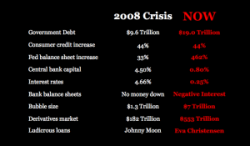Crude Oil Fractals & Funding Fears
Submitted by Jeffrey Snider via Alhambra Investment Partners,
From June 2014 until late January 2015, oil prices (WTI) fell about 60%. From June 2015 until late January 2016, oil prices (WTI) fell about 60%.
The exact track each annual trading history took to achieve those results is different (2014-15 much more straight ahead and persistent; 2015-16 jagged and irregular), but you can’t deny the repetition in both the amount of time and the ultimate scale of the collapse.


